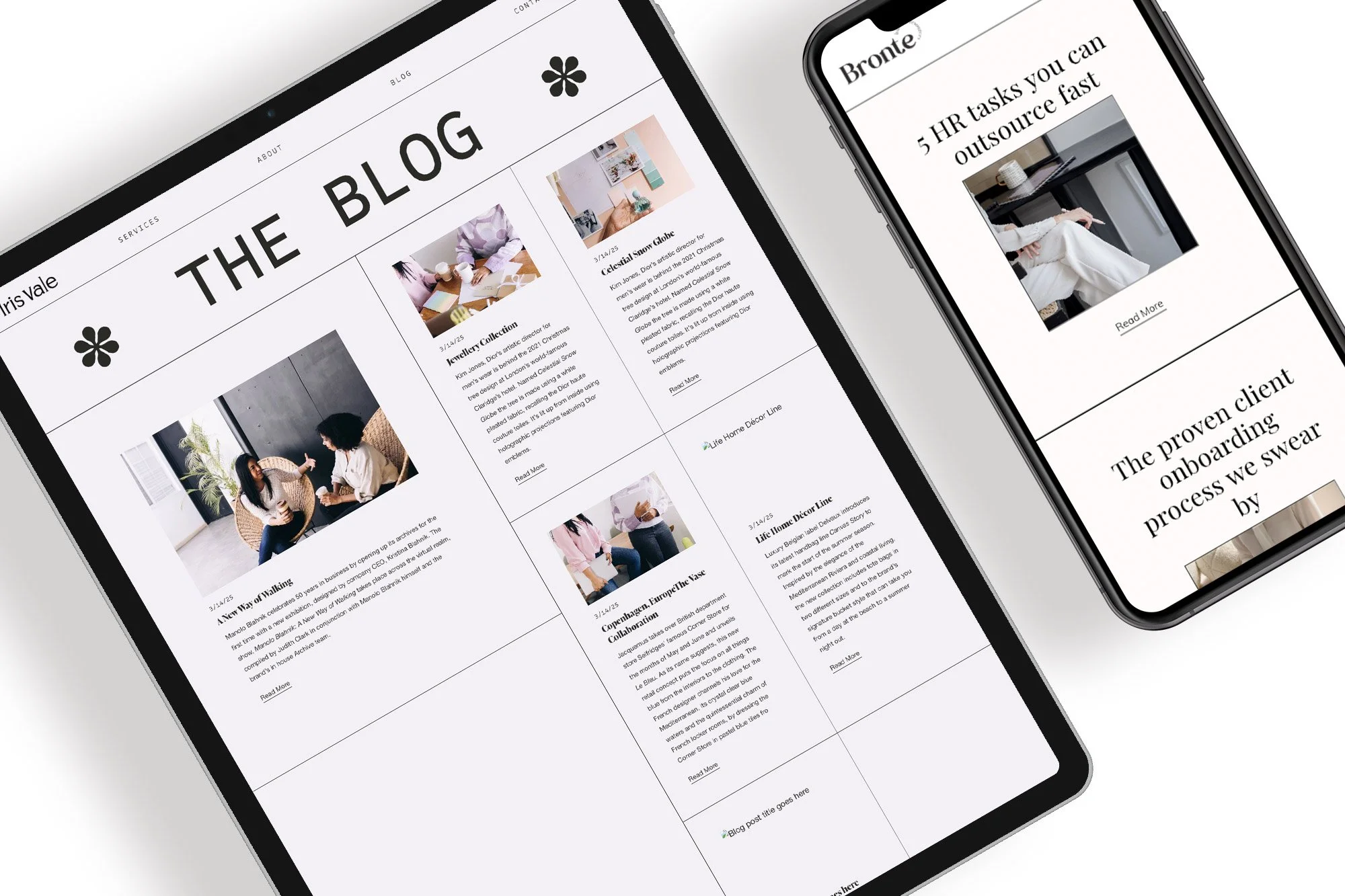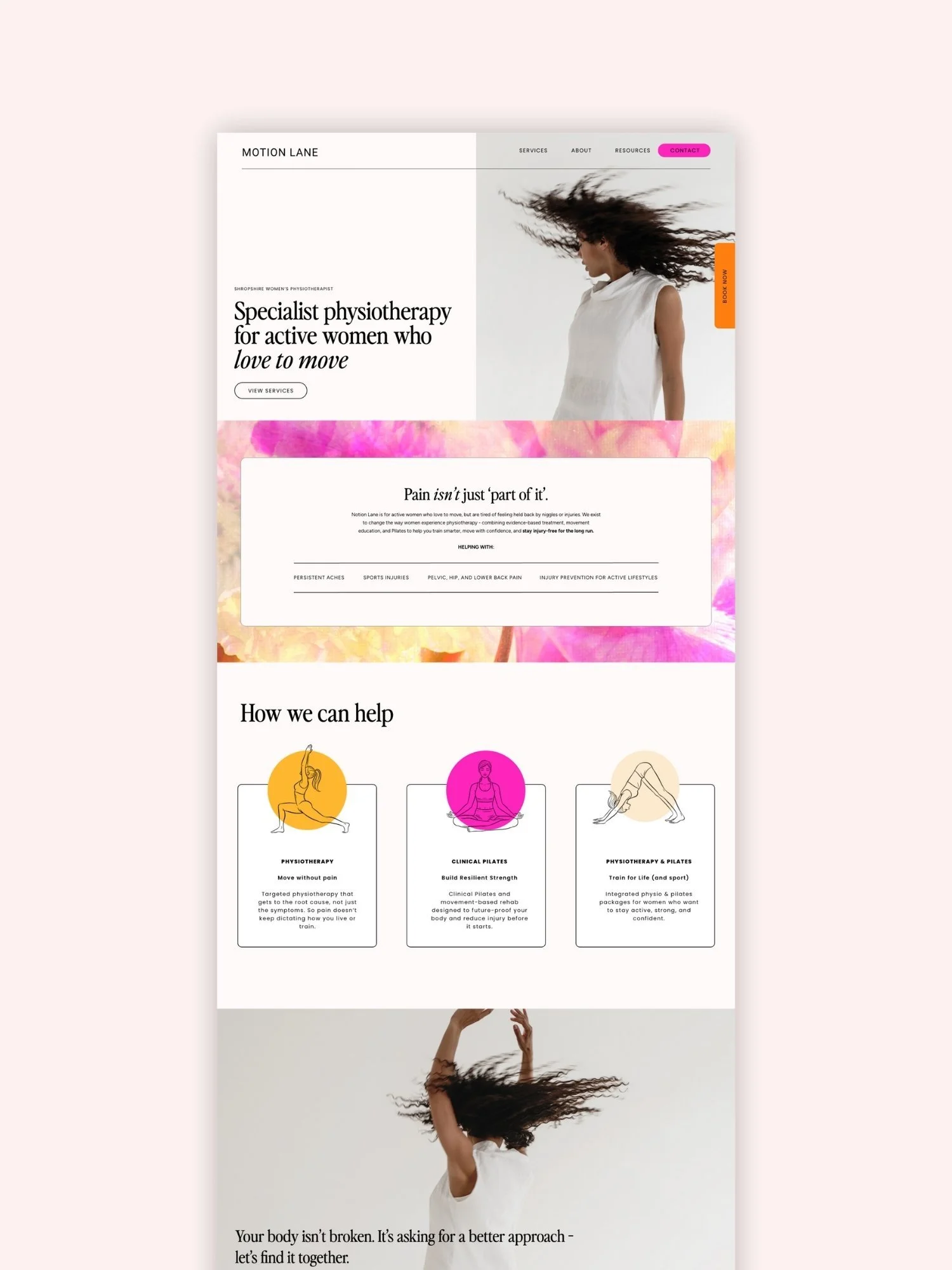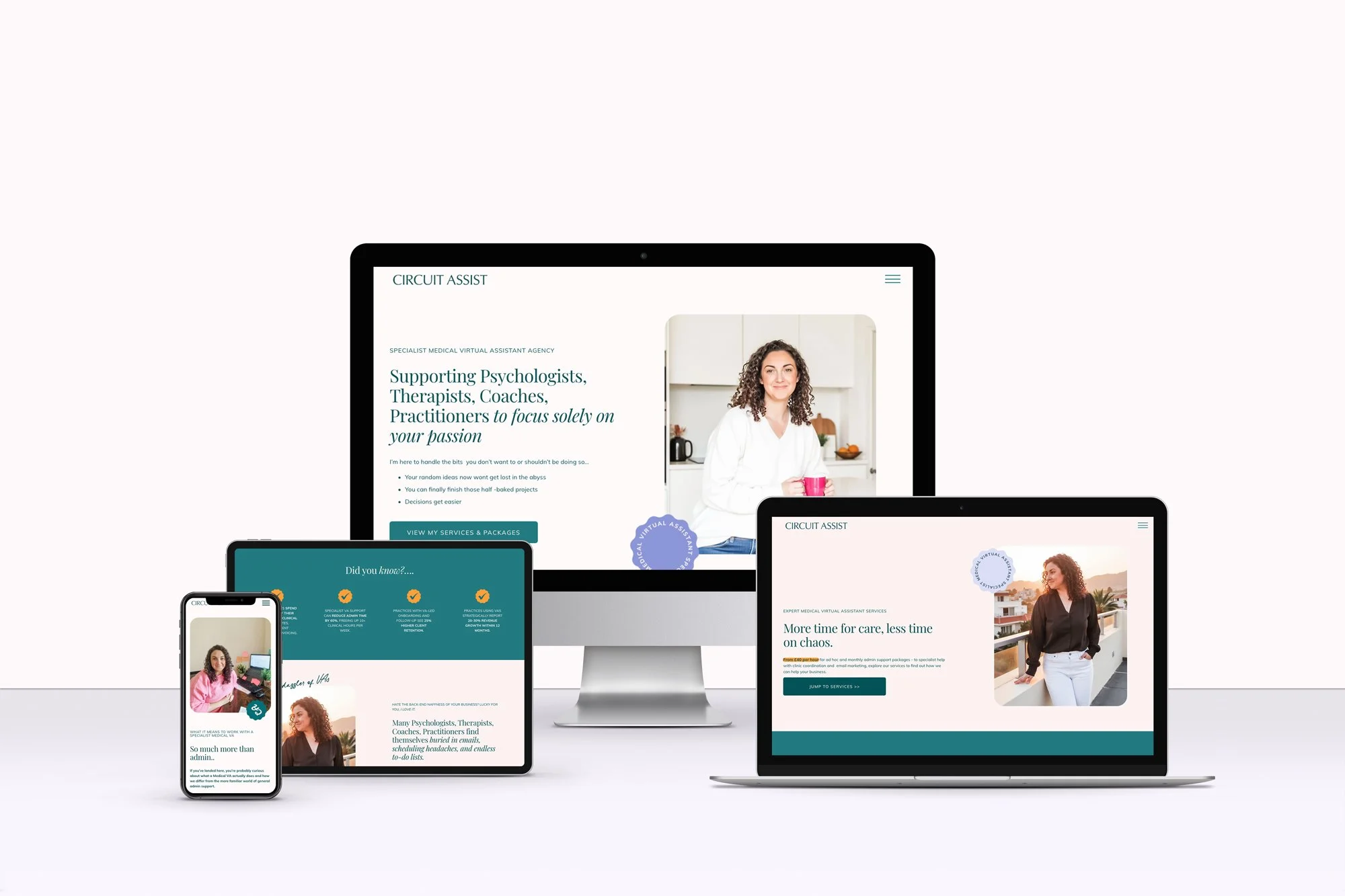Using Squarespace for blogging: Why it’s still one of the best platforms for small businesses in 2026
Have you thought about blogging in Squarespace?
As a small business owner, I’m sure I’m not alone when I say - the marketing advice comes thick and fast:
Publish content on Instagram
Connect and engage with your ideal clients on Linkedin
Create YouTube videos
Oh, and find out what Threads is all about and sign up for that too…
….It’s fast-paced and, if you’re anything like me, it’s pretty hard to keep up. Especially when you’re also delivering work for your clients.
But perhaps the best, and most realistic advice, is that it’s better to focus your time on just two or three marketing platforms.
And do them well.
Whilst blogging seems to have a quieter following than social media, actually it’s a great marketing platform for small businesses to consider. The stats back this up:
Small businesses that blog experience 126% more lead growth than those that don’t.
This makes blogging an absolutely perfect marketing platform choice for service-based business owners who are feeling a little exhausted or overwhelmed by social media.
And if you’re looking for a beautiful, easy-to-manage platform for blogging, Squarespace is one of the best tools for the job, even if you’ve never written a blog before.
In this guide, I’ll walk you through:
Why blogging still matters for small-business growth
Why Squarespace makes blogging brilliantly simple
How to use AI tools to save time and maximise your blog content
And how blogging helps you attract clients whilst building authority online
Why should you blog?
Firstly, if you’re considering spending time on a marketing platform, you absolutely want to know the reasons why. Here are my top ones:
It makes creating content on other platforms faster and easier
This is the main reason I love to blog. Whilst creating each blog post does take time, once it’s published it can be leveraged to create lots more content for the other channels you use. Blogging can become the ‘north star’ of your marketing, and provide you with a huge amount of content to use across other platforms (read section further down blogging with AI tools for my top tips for maximising your blog).
It’s not a numbers (or daily posting) game; it’s slower and more considered.
If you prefer meaningful, helpful content over constant posting, blogging might be the perfect fit. For me, I really like that blogging is all about connection and serving your clients, not creating noise. If a potential client asks a question, it’s great to follow up your response with, “I’ve actually written a blog about that if you’d like more information, here’s the link….”. It helps you build trust and position yourself as someone who genuinely wants to help.
It’s proven to build authority
The numbers speak for themselves, with 81% of consumers saying they trust advice and information from blogs (source: HubSpot). When someone reads a helpful, well-written post from you, they instantly see you as a trusted expert. With time, trust translates into more enquiries and clients.
It grows your website traffic
Each and every blog post you publish creates another page for Google to index - which means more chances for potential clients to find your business website organically via search engines or AI searches. Brilliant news!
Why blogging still matters (even in a social media world)
Many small-business owners rely on Instagram or LinkedIn for visibility as they’re fast and free. But they don’t come without limitations because content disappears quickly and engagement depends on ever-changing algorithms.
A blog, on the other hand, builds long-term, meaningful visibility because:
It’s there to stay
Blogs will sit on your website forever and always be accessible for people who are looking for that information via search engines and AI searches.
It directly speaks to, and attracts, your perfect clients
Blogging allows you to answer real questions or sticky issues you’ve heard from your real clients - so the people who discover you are already pre-qualified and interested in what you offer.
It works while you sleep
Unlike social posts that vanish in 48 hours, your blog content keeps bringing traffic for months (even years).
Why use Squarespace for blogging?
If you’re already using (or considering) Squarespace for your website, adding a blog is incredibly straightforward.
But actually, even if you’re starting from scratch, you’ll find Squarespace for blogging is one of the most beginner-friendly platforms available because:
It’s all-in-one: Squarespace offers hosting, design and blogging tools all live under one roof. There are no plugins to update so no tech headaches - it’s just a case of logging in and starting writing.
Clean, modern design: Squarespace will make your blog look beautifully clean and professional. And you can easily customise fonts, colours, and layouts to fit your brand - all without touching code
Mobile-friendly by default: This is so important as a lot of visits to you website will likely be from mobile users. In Squarespace, every blog design automatically adapts for mobile, which keeps Google (and your lovely readers) happy.
Built-in SEO tools: Squarespace includes SEO settings like meta titles, descriptions, and alt text fields. It’s simple but powerful enough for most service-based businesses.
Easy publishing workflow: It’s super easy to use, you’ll love it. In fact you can create, schedule, and publish posts in a matter of minutes. Squarespace even lets you duplicate posts to use as templates which is great for regular series or recurring content.
Easy to follow analytics: Squarespace’s built-in analytics show which posts attract traffic and where visitors come from - always helpful for refining your content strategy and seeing what’s working.
What should I blog about?
The best blogs are strategic and aligned with the needs and interests of your ideal clients.
To brainstorm possible topics, write a list of:
Questions you get asked regularly about your service, both on discovery calls and out and about networking.
Key trends or events in your industry that your clients might be curious (or confused) about.
Guides or helpful tips you can offer that make your clients’ lives easier.
Any common mistakes or misconceptions you often clear up
Behind-the-scenes insights into how you work and what makes your approach different.
Once you have a list of blog topics, check that they:
Link back to your services.
Clearly showcase your expertise.
Speak directly to your perfect clients and address problems or concerns you know they’re experiencing.
Think about creating content pillars which are key themes that represent what you do and who you help. These pillars make it easier to stay consistent and ensure every post has a clear purpose.
For example, if you’re a consultant, you might write about:
Client case studies that bring your business to life.
The processes and systems you follow (and why they work).
Thought leadership or reflections on industry trends.
Advice on how clients can get the most out of working with someone like you.
If you’re a health practitioner, you could share:
Educational posts about your methods or specialisms.
Lifestyle or mindset tips that complement your services.
Clinical updates in your field.
Stories that show the real impact of your work.
And if you’re a virtual assistant, you might focus on:
Productivity tools and time-saving hacks.
Behind-the-scenes insights into how you support clients.
Advice for small business owners who are ready to outsource.
Quick tip: each post should connect naturally to one of your services pages so you can link to relevant services in your post. This helps readers move from ‘interested’ to ‘ready to work with you.’
The benefits of blogging on Squarespace for client-focused service providers.
In a nutshell, blogging helps you attract clients whilst building authority online.
It’s about sharing your thoughts - but also showcasing your expertise in action.
Each post you publish gives potential clients a glimpse of what it’s like to work with you. It builds trust long before you’ve even met, helping them feel confident that you understand their challenges and have the experience to help.
It will looks different for every business, here are some of the ways my clients use their blogs:
Becca from Upton Neuro Physio users her blog to share insights and updates regularly so visitors can see her commitment to staying current in her practice.
Novum Salons share information about their incredible treatments to educate and empower their clients - their blog helps to drive traffic to their website.
How AI can help speed up your blogging workflow
There’s no way around it - if you want to create a helpful, value-paceked blog that connects with your audience - planning, researching and writing it will take time.
Luckily to speed up your workflow, AI is a brilliant support tool.
You can use AI to help with structure you post with:
Idea generation: Ask AI tools for blog topic ideas based on you keywords you can realistically rank for in search engines, services and the questions your clients often ask.
Outlining: Use AI to create a first-draft outline which will save time thinking about structure and flow.
Editing & polishing: Once you’ve written your draft, ask AI to check grammar or suggest smoother phrasing (while keeping your natural tone intact).
The absolute best part, though, comes after you’ve written your blog.
Because once you’ve written a post in your own voice, you can use AI to repurpose it into multiple pieces of content, saving hours of brainstorming and writing from scratch.
This means you a bank of social media content, in your tone of voice (no sounding like generic AI).
For example, paste your blog into your preferred AI tool and use this prompt:
Prompt to use above your blog text: “Using the content of this blog post, including tone, style and exact phrases so it sounds like my voice, create [three LinkedIn posts / two Instagram carousel captions, and one short video or reel script]. Each piece should feel [insert adjectives you want it to feel e.g. helpful, educational, empowering, fun] and completely aligned with my brand voice.”
You’ll instantly have a week (or more) of content ready to publish that’s consistent, in your voice, and all leading back to your website.
FAQs
What is the cost of blogging on Squarespace
One of the best things about blogging with Squarespace is transparency of costs.
Monthly plan: from £12 per month which is ideal for basic blogging.
Add-ons: Optional domain (£16 yearly) and email (£6 per month).
That’s it. No hidden plugin fees or hosting costs making Squarespace incredibly budget-friendly for growing small businesses.
Is Squarespace good for bloggers?
Absolutely. Squarespace for blogging is ideal for service-based business owners who want a simple, professional blog without technical setup.
While advanced customisation (like complex code tweaks) is limited, for most small-business use it’s more than enough.
Can you make money blogging on Squarespace?
Yes your can - indirectly. Squarespace blogs don’t have built-in monetisation like ads or affiliate widgets, but they do attract clients and sell your expertise.
For example, a burnout coach can use a blog post about ‘stress management’ to attract readers, then link to a free consultation or paid course. Your blog becomes part of your sales funnel - educating, building trust and guiding readers toward your services.
Other blogs by Bright Avenue you may like to read:
Final thoughts
Blogging with Squarespace gives you a platform to grow, showcase your expertise, and attract your perfect clients.
And with AI tools to lighten the workload, it’s easy to get started.
Simply login to Squarespace, create your first post, and start sharing your story. The sooner you start, the sooner your ideal clients can find you.
I’d love to know how you get on.






















